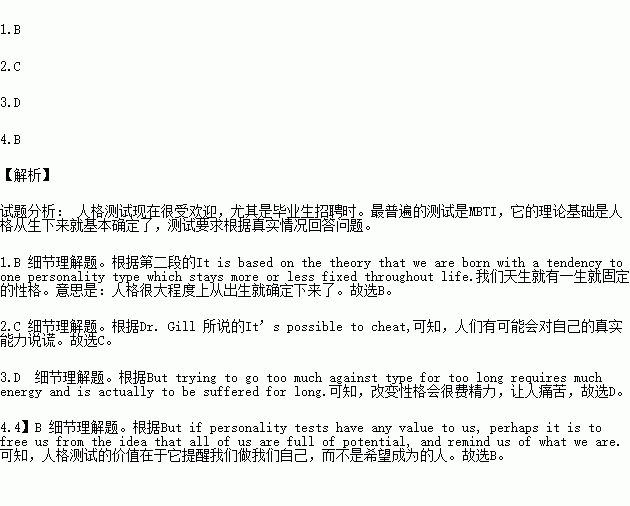题目内容
Finding the Real You
Psychometric testing—personality testing—has been very popular nowadays as studies show their results to be three times more accurate in predicting your job performance. These tests are now included in almost all graduate recruitment (招聘) and are widely used in the selection of managers.
The most popular of these personality tests is the Myers-Briggs Type Indicator (MBTI). It is based on the theory that we are born with a tendency to one personality type which stays more or less fixed throughout life. You answer 88 questions and are then given your “type”, such as Outgoing or Quiet, Feeling or Thinking.
Critics of personality testing raise doubts about “social engineering”. Psychologist Dr. Colin Gill warns that the “popular” personality traits (特性) have their disadvantages. “People who are extremely open to new experiences can be butterflies, going from one idea to the next without mastering any of them.” However, the psychometric test is here to stay, which may be why a whole sub-industry on cheating personality tests has sprung up. “It’s possible to cheat,” admits Gill, “but having to pretend to be the person you are at work will be tiring and unhappy and probably short-lived.”
So can we change our personality? “Your basic personality is fixed by the time you’re 21,”says Gill,“ but it can be affected by motivation and intelligence. If you didn’t have the personality type to be a doctor but desperately wanted to be one and were intelligent enough to master the skills, you could still go ahead. But trying to go too much against type for too long requires much energy and is actually to be suffered for long. I think it’s why we’re seeing this trend for downshifting—too many people trying to fit in to a type that they aren’t really suited for.”
Our interest in personality now exists in every part of our lives. If you ask an expert for advice on anything, you’ll probably be quizzed about your personality. But if personality tests have any value to us, perhaps it is to free us from the idea that all of us are full of potential, and remind us of what we are. As they say in one test when they ask for your age: pick the one you are, not the one you wish you were.
1.The Myers-Briggs Type Indicator is based on the belief that ______.
A. certain personality traits are common
B. personality is largely decided from birth
C. some personality types are better than others
D. personality traits are various from time to time
2.According to Dr. Gill, what is the problem with personality tests?
A. Employers often find the results unclear.
B. They may have a negative effect on takers.
C. People can easily lie about their true abilities.
D. The results could be opposite to what employers want.
3. In Dr. Gill’s view, how easy is it to change your personality?
A. It’s possible in your adult life.
B. It’s easy if you have great motivation.
C. It’s difficult before the age of 21.
D. It’s unlikely because it requires much energy.
4.What final conclusion does the author reach about the value of personality tests?
A. They are not really worth doing.
B. They may encourage greater realism.
C. They are of doubtful value to employers.
D. They can strengthen the idea we have of our abilities.

